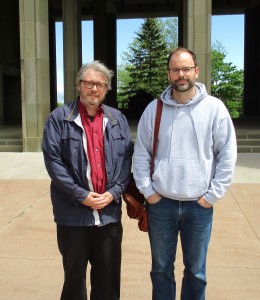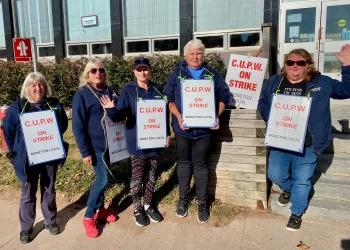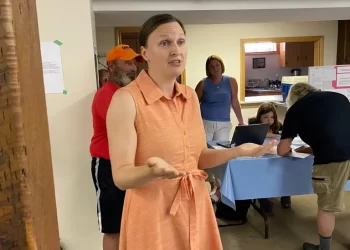
Two Canadian political science professors contend there is a desperate need to find alternatives to the capitalist economic system. In their new book, The Servant State: Overseeing Capital Accumulation in Canada, Geoffrey McCormack and Thom Workman write that the “grotesque inequities of the capitalist system feed hatred, nourish misogyny, promote chronic dispossession and wreak havoc on the environment.”
McCormack, an assistant professor at Wheelock College in Boston, and Workman, who teaches at the University of New Brunswick in Fredericton, discuss The Servant State during a 53-minute interview posted today on the New Books Network website in the U.S.
“In the best of times, capitalism tends to produce unemployment, it tends to produce poverty, it tends to produce war, environmental degradation and alienating conditions for workers,” says McCormack.
“We tend to be a little more insulated…in the Canadian context,” Workman adds. “But when we open our horizons up to the globe, to humanity writ large, we see grotesque exploitation and misery imposed on far too many people.”
Coercive capitalism
As its title suggests, their book argues that governments in capitalist states primarily serve the interests of the capitalist business class, not the majority of citizens.
“The idea of a servant state and the subtitle ‘overseeing capital accumulation in Canada’ draws out emphatically this underlying theme that the state is not really a democratic state in a meaningful sense of the word democracy,” Workman says pointing, for example, to what he and McCormack call the coercive character of capitalism.
“People will colloquially say all the time, ‘you must work to pay the rent.’” Workman says. “The state ensures through its policies that you don’t forget that.”
He adds, for example, that unemployment insurance benefits are always short-term forcing workers to take jobs when their payments run out even if those jobs are insecure and poorly paid.
McCormack acknowledges that the Canadian state provided more generous social benefits in the so-called golden age of capitalism after the Second World War when business profits were growing and unions had more power.
“It [the golden age] was premised upon a period of relatively strong growth and stability coupled with a working-class movement that pressured the state to make it possible,” he says. “Today we don’t have a working-class movement in Canada and the conditions, the underlying conditions of capital accumulation that made that period possible, have also eroded.”
Capitalism and crisis
McCormack predicts the golden age will never return partly because capitalism is prone to recurring periods of crisis as profits inevitably stagnate or decline.
“When there are periods of renewed growth, they tend to come at the expense of working people,” he says. “It means longer working hours, it means lower real wages, it means a more intense work life, it means higher productivity, it means more coercion at the work place, it means a higher degree of supervision, it means more stress, more alienation. It also comes at the expense of massive unemployment, restructuring and moving people around.”
The Servant State argues that the social benefits of the post-war period came at a high political price as the left in Canada moved away from its initial opposition to capitalism in the 1930s; the state waged repression in the name of anti-communism and labour unions purged their more radical members.
“In order to secure those gains, we had to shelve the idea of any kind of radical or socialist agenda,” Workman says. “Left-wing politics was reduced to policy considerations which is fine until another crisis comes along and then, all we are doing is reacting to policy issues and policy matters and the left is absolutely ill equipped to deal with the more profound problems that capitalism naturally engenders.”
McCormack and Workman warn it’s a mistake for the left to think it could capture the capitalist state and use it to improve conditions for poor people or the working class.
“What our book does is to cut through these two ideas,” McCormack says. “It cuts through the idea that the state is somehow neutral and thats it’s something that simply can be captured and then, put to good use, and it also cuts through the idea that capitalism can sustain periods of prosperity for working-class people — and it can’t.”
Needs not profits
The authors argue that to move beyond capitalism, it would be necessary to establish a democratically planned economic system based on needs, not profits.
As examples, Workman points to the Mondragon federation of workers’ co-operatives in the Basque region of Spain, the Oaxaca Commune in Mexico or the Brazilian back-to-the-land movement.
“We see many different examples…of economies that are really starting to drift towards, or becoming wholly centred around, the production of things for people’s needs as opposed to profits for a select few,” Workman says.
McCormack adds that such a needs-based system would avoid the recurrent crises of capitalism — he calls it the first social system in the world in which abundant goods and resources are periodically wasted.
“We’re effectively talking about a society in which everyday people control their own destiny, control their own lives politically and economically,” he concludes.
Bruce Wark worked in broadcasting and journalism education for more than 35 years. He was at CBC Radio for nearly 20 years as senior editor of network programs such as The World at Six and World Report. He was the first producer of The House, a Saturday morning program on national politics. He currently resides in Sackville where he publishes Warktimes.



![Livestream: Social Forum in Wolastokuk — DAY 2 [video]](https://nbmediacoop.org/wp-content/uploads/2025/10/Penombre18-4-sur-4-350x250.jpg)




![Is pollution from industry causing the neurological disease ALS in New Brunswick? [video]](https://nbmediacoop.org/wp-content/uploads/2025/10/Quintin-Soloviev-Belledune_Generating_Station_in_New_Brunswick_Canada-120x86.jpg)

